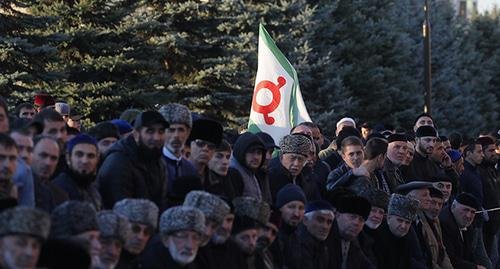On March 26 it was exactly two years since the protest in Ingushetia, which was followed by mass repression of the republic’s residents. After the rallies in Magas 48 criminal cases were initiated under the article on violence against the representatives of authorities, about 30 people received real sentences. Still in pre-trial detention facilities there are protest leaders who have tried to assert the rights of their people peacefully. Lawyers and human rights activists shared their views with Fortanga on the current socio-political situation in Ingushetia.
Lawyer and social activist Magomed Bekov:
I assess the situation in the republic as steadily difficult, although I do not live there. These are my personal observations from conversations with relatives, friends, community members, as well as observations on social media. For two years the situation in the republic has not improved, a chasm has formed between the people and the authorities, there is no linking thread, no real steps are seen to establish a dialogue with the people and return the trust of citizens to the authorities.
The Ingush case is unprecedented in our country, and the structure of the charges brought against our protest leaders has no parallel in Russia. I am sure that this case is a way of breaking Ingushetia’s civil society and raising the obedience of all those who disagree with the arbitrary rule of the authorities. Recent events with the return to custody of Zarifa Sautieva show that the principle of humanism and objectivity of the court of first instance will be violently suppressed by servants of justice of higher courts, we were told about it, but this is not a reason to despair, we will fight for our prisoners and hope that in this vicious system there is a man in the robe or in shoulder straps who has not sold his conscience for ranks, awards and a warm place under the sun.
Ingush human rights defender Magomed Mutsolgov, head of the «MAShR» organization:
The authorities in the republic, though renewed, continue to live apart from their people. This was especially evident at the height of the pandemic, when ordinary people took the brunt of the blow, and it was the people, not the government, who helped then. And everything was and still is based on civic initiative. Unfortunately, we are far from economic or political prosperity; moreover, all that was previously lost is also lost, and now we are standing still, losing our most valuable asset — time.
Everything about the rally case is one of the biggest repressions in modern Russia. And, it must be said, March 2019 wasn’t just a rally, it was a dignity protest. For 14 days in a row, there was not a single act of vandalism, there were no riots, and the people behaved with culture and dignity. And now there is no basis for blaming the citizens, as the population had one goal — to make them respect their rights and the Constitution. I am inclined to believe that this repression is a trivial grudge or revenge against generals who can influence economic and political opinion in the country. Undoubtedly, all those who have fallen under these repressions are both victims and heroes in the eyes of the entire republic.»
Karinna Moskalenko, human rights defender, member of the Russian Committee of Human Rights Defenders:
The protest of these people cannot be regarded as an anti-social action, much less as an administrative or criminal offence. The authorities have no right to accuse them because they were exercising their rights, peacefully and without aggression. Our defendants, two years after those events, are in custody without any evidence of their guilt. And we have repeatedly raised the issue of their release.
After Zarifa Sautieva was returned to the detention center, we expressed our indignation by sending a telegram to the Chairman of the Supreme Court of the Russian Federation. We complained about the violations committed against all the defendants and violations of Russian law in general. Because, before the statutory three-day period expired, the case was withdrawn from the trial court and taken to the appellate court. And the Stavropol Territorial Court issued a decision on 16 March, when the statutory deadline had not yet expired. That’s not how justice works! This is a disgrace and a demonstration of the lack of independence of the entire Russian justice system».
